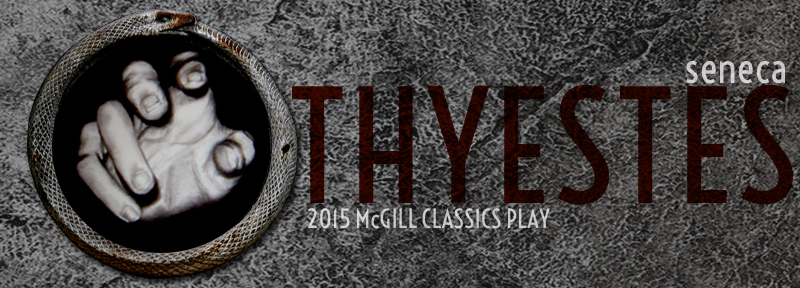In a world where Hollywood churns out high-budget Classics-themed blockbusters like Troy (2004) and 300 (2006) every few years, it’s pretty common to find these types of ancient stories being retold in a dramatic form that’s accessible to modern audiences. What’s far more rare though, is to come across a live production that actually stages ancient drama more or less as it was written; but three weeks from now, that’s exactly what will be happening when Thyestes, the fifth instalment of the McGill Classics Play, begins its four-show run at the Plateau’s La Sala Rossa.
Formed in the 2010-2011 school year by Classics professor Lynn Kozak, the McGill Classics Play is an organization which aims to provide a space for the exchange of arts and ideas around classical texts in the Montreal community. Its main annual project is staging a production of one of those dramatic texts—but only after it has undergone an original translation. This year, the responsibility for that daunting task fell on the shoulders of director Duncan McDonald (U3 Music and Greek Language), who had never tackled such an assignment before signing on for Thyestes.
“To translate it yourself, not in a class setting, and to have that goal of a performance-ready version, it’s a whole different experience,” said McDonald. “Because you’re thinking about way more things than you normally would [….] You’ll try and match what’s in the Latin word for word, but that doesn’t sound good in English, so it’s really turning it into a good English version that’s the most difficult.”
On top of the translation, which was mainly done over the summer, McDonald needed to completely add directorial vision to a text that may not have actually been performed.
“[Thyestes] is written by Seneca, who was basically prime minister for the Emperor Nero in the first century AD, and he wrote a series of tragedies in Latin on Greek mythological themes. What’s interesting about those is that we’re not actually sure if they were ever performed or if they were plays written for recitation in a room without being staged, the scholarly consensus isn’t there,” he explained. “So these plays have no stage directions, all you have is the text [….] You had to basically think of what you wanted before you started translating.”
In arranging Thyestes, there was another more genre-specific challenge McDonald needed to work through.
“One of the big things in classical drama is that there’s always a chorus, which at certain points in the play comments and kind of sums up the action, and it varies: Sometimes they can be part of the action or they’re separated from the action, so you have to decide what to do with them,” described McDonald. “And the way they speak, it’s these kind of ornate speeches [….] so deciding what to do with those is also a challenge. How do we make these big speeches interesting and engaging?”
Challenges aside, McDonald is excited about presenting Thyestes since there’s a lot that appeals to him in terms of its background and themes.
“The Classics Play had done four straight years of Greek plays, so I thought it would be cool to do a play in Latin because there’s a different sort of feel to the language, different structure,” McDonald said. “Also, the story itself is really attractive because you have this supernatural stuff—ghosts, demons. The language is completely over the top extravagant, and [there’s] cannibalism, murder, betrayal [….] I could really see a dark, baroque, spooky production.”
While the play is fairly sinister and dark, McDonald expressed that it’s been a pleasure working with its 12-person cast and the crew members.
“It’s a good, manageable group; it’s a good energy, and I think we’re looking forward to an exciting production.”
Thyestes will be performed from Monday, Feb. 9 to Thursday, Feb. 12 at 8 p.m. at La Sala Rossa (4848). Student tickets are $8.








